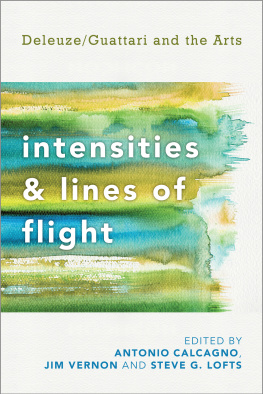ALSO AVAILABLE FROM BLOOMSBURY
Being and Event, Alain Badiou
Conditions, Alain Badiou
Infinite Thought, Alain Badiou
Logics of Worlds, Alain Badiou
Theoretical Writings, Alain Badiou
Theory of the Subject, Alain Badiou
Anti-Oedipus, Gilles Deleuze
Thousand Plateaus, Gilles Deleuze and Flix Guattari
Molecular Revolution, Flix Guattari
Schizoanalytic Cartographies, Flix Guattari
The Three Ecologies, Flix Guattari
Seeing the Invisible, Michel Henry
After Finitude, Quentin Meillassoux
Time for Revolution, Antonio Negri
Althussers Lesson, Jacques Rancire
Chronicles of Consensual Times, Jacques Rancire
Mallarm, Jacques Rancire
Politics of Aesthetics, Jacques Rancire
The Five Senses, Michel Serres
Rome, Michel Serres
Statues, Michel Serres
Art and Fear, Paul Virilio
Negative Horizon, Paul Virilio
FORTHCOMING FROM BLOOMSBURY
Ecosophy, Flix Guattari

CONTENTS
TRANSLATORS
INTRODUCTION
Planetary equipment: from institutions and assemblages to integrated world capitalism
Flix Guattari has not been well-served by the academic machine. He was marginalised almost from the start of his joint work with Gilles Deleuze, who was generally seen as the brains behind Anti-Oedipus, the book that procured for them a certain amount of renown (if not notoriety). And the extraordinary growth in critical scholarly commentary on their joint writings has tended to revolve around an appreciation of Deleuzes work, whose claim to the production of a metaphysics has all too often been addressed with scant regard for the important role that Guattari played in their construction of a philosophy in the years between May 1968 and Guattaris death. Of course, seeing Deleuze as a quirky metaphysician presents some interesting and fascinating problems for professional philosophers and there is no doubting the immense subtlety and nuance of his thinking and the scope of his engagement with the history of philosophy. Yet there was always an institutional and experiential challenge embodied in their double-headed writing machine that all too easily falls by the wayside when Guattaris role is downplayed, especially when what is preferred is an inscription of their thinking within canonised scholarly problematics (that Deleuze for one was always quick to repudiate).
As thinkers together of an unconscious that invested directly in the movements of history schizophrenic delirium, with its world historical, political, and racial content serving for them as something of a starting point for understanding both the diabolic powers knocking on the door, as well as the compromises established with those powers by psychoanalysis it would be all too easy to find in their work the traces of a rather romantic lionisation of madness that was common currency in the tumultuous France of the late 1960s and early 1970s. However, there is more to Deleuze and Guattaris invocation of the importance of the experience of psychosis than the judgement that they romanticise (or aestheticise) schizophrenia would allow and it is Guattaris work that makes this point blindingly obvious.
From a rather early stage in his work, Guattari evinced a desire to escape from what he saw as the methodological individualism of psychoanalysis, its reliance on one-on-one dialogue and its lack of engagement in the difficult, ongoing task of treating psychosis in the institution. There was an absence of sustained direct involvement with psychosis on the part of Freud (Schreber, through his writings, Little Hans through his father) and only a minimal involvement on the part of Lacan (the Papin sisters, for diagnostic purposes), and this, for Guattari, was a problem. The phony contractualism of the analytic relationship, with its ostensible exclusion of third parties and focus on the individual, was not something that found a very positive response amongst institutional psychotherapists, by virtue of the broader institutional qualities of the delegation of the treatment of madness to particular groups of people in society (to say nothing of the concrete realities of institutional situation). And the historical experiences of progenitors of institutional psychiatry such as Tosquelles during the Second World War (the need to work with non-professional staff, the use of the Saint-Alban hospital to shelter members of the Resistance, and so on) would mean that La Borde was a propitious domain for Guattaris own background of militancy in the student movement.
In his early writings, Guattaris conceptual displacement/relativisation of analytic transference by institutional transversality is one particularly fruitful outcome of the complex encounter between politics, therapy, psychoanalysis and the psychiatric hospital, and it sustained a rethinking of the unconscious in a social direction, breaking down the tacit hierarchy inside and outside the institution on which the contract rested, and re-instating first with the idea of the institutional object, then with the idea of the desiring machine the third party putatively excluded in one-on-one dialogue. In addition to generating a perception of the importance of the group, of relations between groups (as in the division of labour) and of concrete institutional arrangements themselves (the institution as a modelling clay for the treatment of psychosis), it also, more broadly, leads to what might be called a de-professionalising of access to the unconscious, accomplished through the generation of conceptual tools that reframed the analysis of desire in directly political terms. Guattari repeatedly returns to the view that the conceptualisation of the unconscious he was engaged in would be an unconscious within reach of anyone!
Guattaris endeavours to tackle the role of the group in relation both to analysis and to politics was clearly something that interested Deleuze, who saw in the theoretical contributions of Guattari to institutional psychotherapy a set of notions that had a precise practical orientation that of introducing into the institution a militant political function, constituting a sort of monster that is neither psychoanalysis nor hospital practice, even less group dynamics, and which aims to be applicable everywhere, in the hospital, the school, in militancy a machine to produce and to enunciate desire.
That Guattaris writings were not only heavily marked by but also aimed to remain faithful to his own experiences of working at La Borde, continuing an analytic practice, as well as working tirelessly in the field of politics is a point that has been made succinctly by one of Guattaris colleagues at La Borde, Jean-Claude Polack, who points out that he always stayed as close as possible to his everyday experience, The reader can follow the train of thought leading Guattari to this argument for him- or herself. But there is a more general point here, which is that contrary to a fairly widespread view, which would hold that theory and experience are opposing, even antinomic terms, for Guattari they are in fact indissociable: like his friend Deleuze, albeit in a slightly different way, Guattari maintains the connection between theory and singularity, an irreversible adventure.
Guattaris discovery of the dimension of transversality had for him entailed an ongoing theoretical and practical critique of the undue privileges that might accrue to the analyst in the institution, a critique given broader scope in










